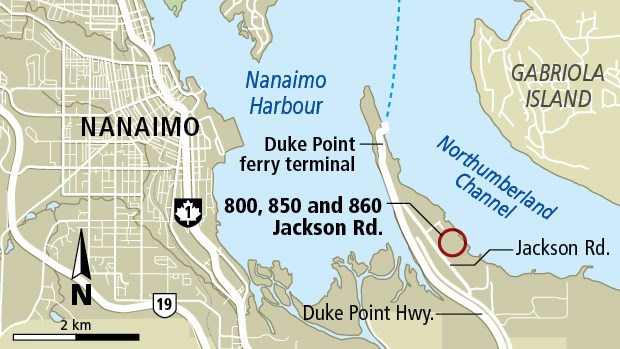Mountains of garbage from Metro Vancouver could soon be barged to Duke Point in Nanaimo for incineration without Island residents having any say in the matter, warns a regional director with the Regional District of Nanaimo.
Metro Vancouver and the regional district are discussing sites for a $500-million waste-to-energy facility that would process 700,000 tonnes of waste a year.
On Tuesday, the Regional District of Nanaimo board will consider Metro Vancouver’s search for a site that meets its “high-level evaluation criteria.” Such a facility could also process Island garbage, regional district staff suggest.
A letter dated May 15 was sent to the regional district from Greg Moore, chairman of the Metro Vancouver board, and Malcolm Brodie, chairman of its zero-waste committee. It touted the benefits of having an incinerator located in the Nanaimo area or elsewhere on Vancouver Island.
Metro Vancouver’s zero- waste committee is eyeing industrial land at Duke Point for an incinerator, said Alec McPherson, Regional District of Nanaimo director for Cedar and former general manager with Washington Marine Group and Canadian Pacific Railway.
He said he is worried about the lack of public notification about incinerator plans for the Island. “If we let it slide, it will be a done deal.”
If the land is appropriately zoned, municipal government has no way to consider public input, McPherson said.
“The Ministry of Environment issues an emission certificate and also a solid waste certificate, and that’s it,” he said. “If the zoning is in place, what’s to stop it?”
Regional district chairman Joe Stanhope said Wednesday he has heard rumours of Duke Point being identified and said, “it’s a no-flyer, right off the bat … It would be a travesty.” Whether the regional district has legal authority to halt such a project “is a good question. I don’t know, but I will find out,” Stanhope said. “The mere fact that they sent us a letter indicates that they can’t arbitrarily turn around and send garbage over here.”
The Fraser Valley Regional District is vehemently opposed to Metro Vancouver’s incinerator going there, citing pollution, cost and other concerns.
In July 2012, Powell River council voted to oppose plans by Metro Vancouver to put an incinerator there. Other public proposals include building a facility in Gold River. The Tsawwassen First Nation has proposed working with Aquilini Renewable Energy on another way to handle the region’s trash.
Metro Vancouver has a short list of 10 technology providers that can process its garbage, and seven of those use incineration, said Paul Henderson, Metro Vancouver’s general manager of solid-waste services.
It’s up to either these providers or landowners to come forward with possible sites and these sites will be made public in November, Henderson said. “We don’t know about any potential sites at this point.”
One short-listed technology provider is Wheelabrator Technologies Inc., a New Hampshire company that operates 17 waste-to-energy plants in the U.S.
B.C. Ferries owns land at Duke Point that’s big enough and zoned appropriately to accommodate an incinerator.
Regional District of Nanaimo staff said in a June 6 report that the idea of processing Lower Mainland garbage within its jurisdiction is “reasonable” but that more scrutiny is necessary.
> Incineration concerns, A4



